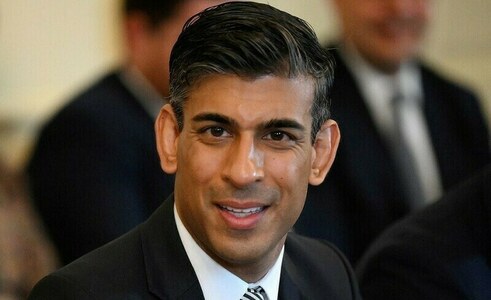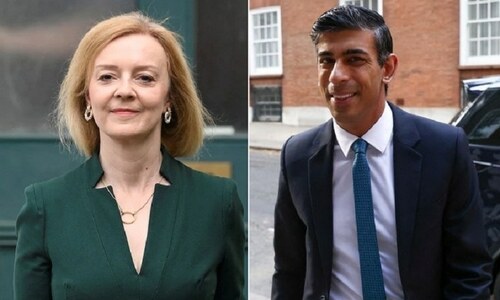
LONDON: Britain’s two prime ministerial contenders clashed fiercely over tax on Monday night in their first head-to-head televised debate, as former finance minister Rishi Sunak seeks to peg back the frontrunner, Foreign Secretary Liz Truss.
The primetime debate kicked off a crucial 12-day period featuring three such live TV duels and four husting events in front of Conservative members who will decide the contest and begin receiving their postal votes next week.
The weeks-old Tory leadership contest to replace outgoing prime minister Boris Johnson has turned increasingly acrimonious, with both sides’ camps fiercely briefing against each other.
That tone was carried into Monday’s live BBC debate, with Sunak savaging Truss’ plans to slash taxes immediately — a key dividing line between the two candidates.
“I don’t think that’s right, I don’t think it’s responsible and it’s certainly not Conservative,” he interjected as the foreign secretary detailed her proposals.
“If we follow Rishi’s plans, we are headed for recession,” she replied, adding that “this chancellor has raised taxes to the highest rate for 70 years”.
The leadership contest comes as Britain grapples with a cost-of-living crisis that has seen inflation surge to a 40-year high.
Sunak has vowed to curb this before cutting taxes, and called Truss’ plans “a short-term sugar rush”.
Opinion polls put Truss well ahead among the roughly 200,000 grassroots party members, after she and Sunak emerged as the run-off candidates in a series of votes by Tory MPs. The winner will be announced on September 5.
Sunak’s resignation as finance minister earlier this month over Johnson’s scandal-hit leadership helped spark the downfall of the outgoing premier.
That has angered some of the party grassroots.
Meanwhile, questions about his family’s tax affairs and his prior decision to retain US residency have also dented his previously high popularity among Conservatives.
Truss initially struggled to gain momentum in the race, but eventually made the run-off by winning over the party’s right-wing MPs with pledges to immediately cut taxes and deregulate.
Monday’s debate was held in Stoke-on-Trent, in front of an audience of people who all voted Conservative at the last general election in 2019.
The area, which backed Brexit heavily in the 2016 referendum, was once a traditional seat of the main Labour opposition. But it switched to the Tories — along with dozens of its other heartland seats — in 2019.
A weekend of bitter sniping by the two candidates’ camps over their respective stances towards China and other perceived UK national security threats, gave way to personal attacks on Monday.
Culture Secretary Nadine Dorries, a Truss supporter, openly mocked millionaire Sunak over his purported expensive taste in clothing, tweeting reports he wore an expensive suit and Prada shoes on a campaign visit.
She contrasted this with Truss being more likely to wear a low price pair of earrings.
The latest so-called blue-on-blue attack prompted an immediate backlash from other Conservatives, with one MP saying she had “muted” her colleague on Twitter while others urged a more conciliatory approach to the race.
“The puerile nature of this leadership contest is embarrassing,” Cabinet Office minister Johnny Mercer said. “Time to raise the standards.”
Newly-appointed finance minister Nadhim Zahawi also took to the airwaves to warn people “don’t vote for teams that are divided”.
The main opposition Labour party, which has been leading in polls for months but may have to wait until 2024 for the next general election, is eager to capitalise on fallout from the bitter Tory battle.
In a speech Monday, Labour leader Keir Starmer branded Sunak “the architect of the cost-of-living crisis” while calling Truss “the latest graduate from the school of magic money tree economics”.
Published in Dawn, July 26th, 2022














































